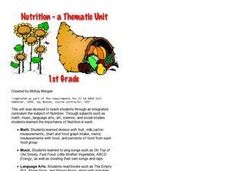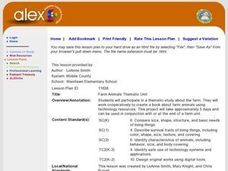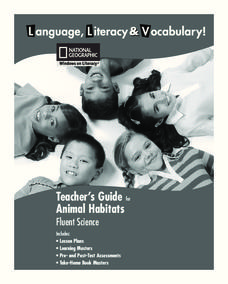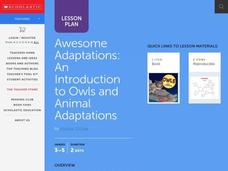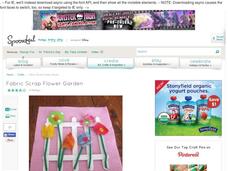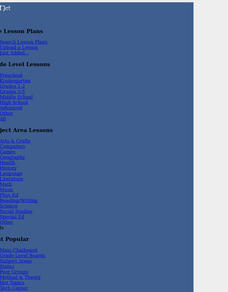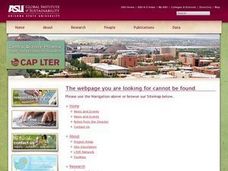Curated OER
Nutrition: A Thematic Unit
Young learners explore nutrition and the food groups in these two mini-lesson plan ideas. First, kindergarteners have a discussion about their health and how different foods contribute to it before making their own personal food pyramid....
Curated OER
Farm Animals Thematic Unit
Student study farm animals by watching a teacher made PowerPoint presentation and visiting a farm. They research a farm animal with teacher assistance. They design a book about the animals using available technology and orally present...
Curated OER
WEAVING TECHNOLOGY INTO THEMATIC UNITS T.O.O.L.S. 2000
Third graders utilize computers and other technology to explain the solar system. Ten different stations involve students through laserdisc, research, art, GeoSafari, space toys, and the computer.
National Geographic
Animal Habitats
Explore animal habitats and reinforce speaking, listening, reading comprehension, and writing skills with a unit that focuses on the Arctic, desert, ocean, prairie, and rainforest. Enthusiastic scientists read informational text to...
Discovery Education
STEM Camp—Urban Infrastructure
Build a bridge to learning in a STEM-aligned unit about urban infrastructure. Young engineers explore the many aspects of civil planning and design in a five-day unit. Content includes the challenging aspects of balancing building with...
Curated OER
Whodunnit?
Want to create an exciting mystery activity? Investigators will identify the elements of a mystery, review mystery stories, then write their own mysteries. They engage in forensic science experiments related to mysteries and learn to ask...
Scholastic
Awesome Adaptations
Engaged learners discover how an owl beak works and how animals adapt to their environment. This task is part one of a three-part series.
Curated OER
Solar System Unit
Young scholars probe an interdisciplinary unit on our solar system. Distances between planets, their characteristics, and applications to student's personal lives are analyzed in this experience. The unit contains seven lessons.
Henry Ford Museum
Sustainability: Environmental Management and Responsible Manufacturing
When you think about environmental sustainability, the Ford Motor Company probably isn't the first company to come to mind. A four-lesson unit introduces learners to the idea of sustainability and environmental stewardship. It describes...
Curated OER
Exploring Arizona's Biotic Communities Lesson 1: Mapping Biotic Communities
As part of a unit on Arizona's biotic communities, young ecology learners create a map. They describe how humans and animals adapt in their habitat. They take notes and create graphic organizers from articles they read. Beautiful maps,...
Curated OER
Fabric Scrap Flower Garden
Crafting is fun, it increases eye-hand coordination, and it is a great way to accent any lesson. Celebrate Earth Day by creating scrap fabric flowers for a pop-stick flower garden. Children of all ages will love gluing, cutting, and...
Curated OER
Pond Theme Unit
In this pond theme instructional activity students research facts on pond life. Students complete comprehension questions, crosswords, word search, and math puzzles. Students write a short report.
Curated OER
What a Nose!
In this science worksheet, students discover that different bat species have distinctive noses. Students examine 6 pictures of bats and cut and paste the names of the bats by each. No information is given but the names of the bats will...
Curated OER
Jackie Steals Home
Students draw on their previous studies of American history and culture as they analyze primary sources from Jackie Robinson and Other Baseball Highlights, 1860s - 1960s in American Memory. A close reading of two documents relating to...
Curated OER
WEAVING TECHNOLOGY INTO THEMATIC UNITS
Fourth graders explore the planets by researching and writing a report about one of the nine planets.
American Chemical Society
Man and Materials Through History
From the start of the Industrial Revolution, it only took 147 years for someone to invent plastic. This may seem like a long time, but in the history of inventing or discovering new materials, this is incredibly fast. An informative and...
American Chemical Society
Development of Baking Powder
Did you know baking powder can be used to treat acne, whiten teeth, and make sugar cookies? The lesson on the development of baking powder is ready-to-go with no preparation required. Through readings, pupils answer questions, complete...
Curated OER
Heat and electrical resistance (Middle, Science)
Middle schoolers work in teams to create electrical resistance when studying heat and thermal energy.
Curated OER
The Animals Kingdom
Students are introduced to the classification system of animals. In groups, they set up an aquarium in which they must maintain throughout the year. They also observe earthworms and how they react to various stimuli and research the...
Curated OER
Using computers in the content area
Students practice grade appropriate computer basics and integrate them into the curriculum areas. in this technology lesson, students understand correct behaviors while using the computer. Students become familiar with the Internet...
Curated OER
Hatched From An Egg
Students discover how animals are born/hatched. In this life science lesson, students listen to a book entitled Chickens Aren't The Only Ones, and discuss animals that are hatched or born. Students receive a picture of an animal,...
Curated OER
Planets in our Solar System
A wonderfully designed, and very thorough lesson plan on the planets in our solar system. Designed for third graders, this lesson has learners use technology and multimedia tools to research, explore, and create information about the...
Curated OER
Comparison of Protein Sequences From Two Samples of Crabmeat Using Gel Electrophoresis As an Introduction To the Biotechnology Lab
Young scholars discover that proteins that are the product of DNA translation are different for different species. They determine that by analyzing their mass and charge they can differentiate between two different species. They use some...
Curated OER
Exploration of 'pill bugs'
Fifth graders define words. They create a dichotomous key. After carefully examining pill bugs, 5th graders record observations. They compare and contrast habitats of pillbugs.
